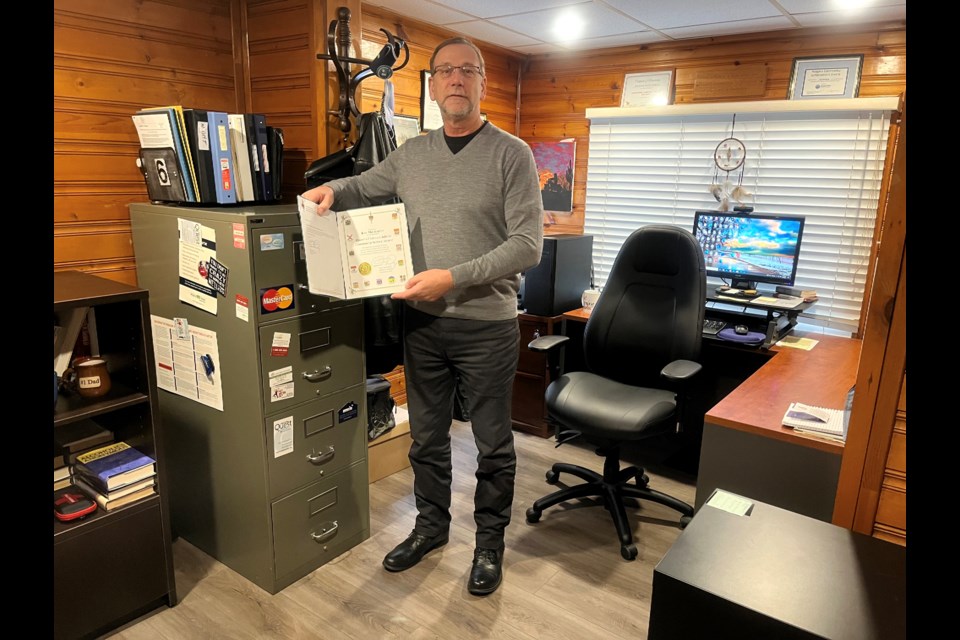After overcoming his own struggle with addiction in 1995, Welland resident Ken MacKenzie decided to devote his life to helping others in recovery.
Last month, his 27-year long service to Thorold-based organization Addiction Recovery In Dignity (ARID) Recovery Homes was recognized with a Queen’s Platinum Jubilee Award.
“It’s an honour,” MacKenzie says, in an interview with ThoroldToday. “I don’t do this work to be recognized. I do it mainly for the residents, and then because it helps me as well. I was kind of overwhelmed. I treasure it for sure.”
ARID operates several group homes in Niagara for people in recovery, including one on Pine St S In Thorold.
The charitable organization was founded by Keith Hornibrook back in 1976.
“Keith worked with the nuns to get the alcoholics rehabilitated,” says MacKenzie. “He would see the same guys coming back and he said: ‘Something’s got to be done in the community.’ He started this house. The first one was on Beaverdams Road. Then he moved [to Pine St S] in 1977 and we became a non-profit organization and a charity.”
MacKenzie became familiar with the organization through his own struggles with addiction.
“I had a big problem with alcohol and drugs,” he says. “I heard about this place, stayed for a little while, left and unfortunately, I didn’t stay sober but I did get back on track quite quickly. I knew sitting around is not good for someone in recovery. I am a person that needs to move.”
While volunteering with ARID, MacKenzie obtained a degree as a social worker, which eventually led to a full-time position with the organization.
After Hornibrook retired, MacKenzie became ARID’s executive director.
“My mother always told me: ‘If you find a job you love you never have to work a day in your life,’” MacKenzie says. “I love coming here and working with other recovering people. That’s what the Alcoholics Anonymous (AA) program was based on, one alcoholic helping another. We’re not giving them a miracle, or making it happen for them. They’re doing the work, we’re just here for them.”
ARID Recovery Homes offers stays of up to nine months for people in recovery.
MacKenzie says that recovery homes are a valuable resource for those trying to overcome their addiction.
“If people who get sober go back home and there’s people in the house drinking then they’re still in that same environment,” he says. “There’s always other issues in life, relationships, financial, all those things that need to be repaired when someone goes into recovery and tries to rebuild their life.”
ARID was founded on the principles of AA and originally aimed to only help alcoholics. Throughout the years, the organization has expanded its scope and it now also supports those struggling with drug addiction. MacKenzie notes that alcoholism often goes hand in hand with other substance abuse issues.
“We’ve opened up our doors to so much more,” he says. “We have to move with the times. I had to convince the board that we’re going to have empty beds if we don’t start letting people in who have drug problems.”
To operate, ARID relies on various subsidies, grants, and fundraising events, but it's not always easy making ends meet.
“My biggest goal right now is to get that base increase in our funding from the ministry because that will be more stable for our staff,” MacKenzie says. “There has to be definite funding and we don’t have that. The government got used to small places like this doing more for less but we’re at a breaking point now.”
While social attitudes to addiction and recovery have evolved over time, there can still be a lot of stigma associated with addiction and recovery.
Through his work, MacKenzie hopes to continue to change society for the better.
“Recovery is ongoing,” he says. “You can’t do it alone. I still go to meetings at 28 years sober. I get recovery every day I come to work. That is very fortunate for me.”
To learn more about ARID Recovery Homes or to donate, head over to their website.



